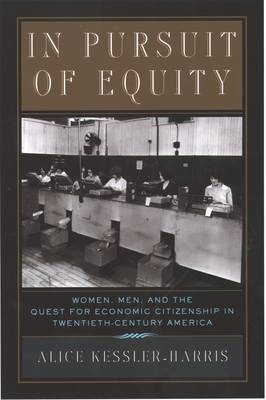
Door een staking bij bpost kan je online bestelling op dit moment iets langer onderweg zijn dan voorzien. Dringend iets nodig? Onze winkels ontvangen jou met open armen!
- Afhalen na 1 uur in een winkel met voorraad
- Gratis thuislevering in België vanaf € 30
- Ruim aanbod met 7 miljoen producten
Door een staking bij bpost kan je online bestelling op dit moment iets langer onderweg zijn dan voorzien. Dringend iets nodig? Onze winkels ontvangen jou met open armen!
- Afhalen na 1 uur in een winkel met voorraad
- Gratis thuislevering in België vanaf € 30
- Ruim aanbod met 7 miljoen producten
Zoeken
In Pursuit of Equity

Women, Men, and the Quest for Economic Citizenship in 20th-Century America
Alice Kessler-Harris
Paperback | Engels
€ 40,45
+ 80 punten
Prijzen
Omschrijving
In this volume, Alice Kessler-Harris explores the transformation of some of the United States' most significant social policies. Tracing changing ideals of fairness from the 1920s to the 1970s, she shows how a deeply embedded set of beliefs, or "gendered imagination" shaped seemingly neutral social legislation to limit the freedom and equality of women. Law and custom generally sought to protect women from exploitation, and sometimes from employment itself; but at the same time, they assigned the most important benefits to wage work. Most policy makers (even female ones) assumed from the beginning that women would not be breadwinners. Kessler-Harris shows how ideas about what was fair for men as well as women influenced old age and unemployment insurance, fair labor standards, Federal income tax policy, and the new discussion of women's rights that emerged after World War II. Only in the 1960s and 1970s did the gendered imagination begin to alter--yet the process is far from complete.
Specificaties
Betrokkenen
- Auteur(s):
- Uitgeverij:
Inhoud
- Aantal bladzijden:
- 384
- Taal:
- Engels
Eigenschappen
- Productcode (EAN):
- 9780195158021
- Verschijningsdatum:
- 6/02/2003
- Uitvoering:
- Paperback
- Formaat:
- Trade paperback (VS)
- Afmetingen:
- 160 mm x 240 mm
- Gewicht:
- 544 g

Alleen bij Standaard Boekhandel
+ 80 punten op je klantenkaart van Standaard Boekhandel
Beoordelingen
We publiceren alleen reviews die voldoen aan de voorwaarden voor reviews. Bekijk onze voorwaarden voor reviews.













